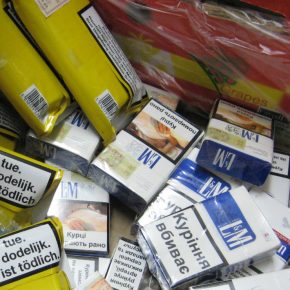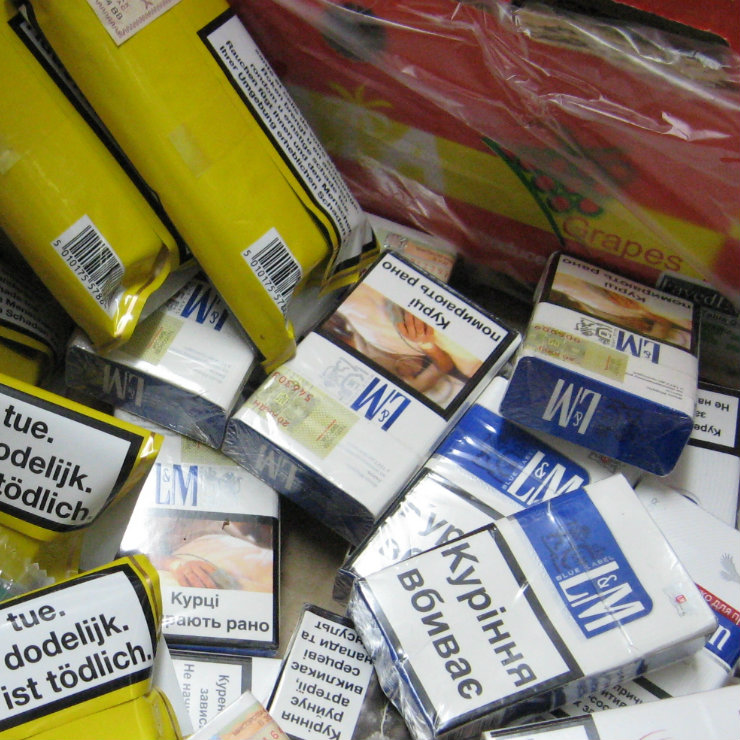
Smuggled tobacco (H.M. Revenue & Customs, CC BY)
The 2019 budget has attracted the ire of economists since it estimates EUR1.516bn of total revenues (a 19.7 per cent y/y increase). Minister of Finance, Vilius Šapoka is convinced that around EUR200m can be collected by fighting a shadow economy and added to the budget.
The fight against the shadow economy has been producing results and successes have been scored by the tax authorities. The total tax revenues expected in 2019 should increase by 30.1 per cent to just over EUR8bn. VAT collection should increase by 8.8 per cent to EUR3.85bn.
Although many experts believe that the Lithuanian economy will perform adequately in 2019, the claim to extract EUR200m has been met with skepticism. Gitanas Nauseda, former chief economist at SEB Lithuania Bank and currently a presidential candidate, is one of the sceptics. “The target, collecting an additional EUR311m from VAT, of which EUR104m, would be due to the improved tax administration is very ambitious but is it feasible…It is very likely that, even with some good measures in hand, the final result can be different from the one we expect”.
The 2019 budget aims to be have a surplus and in terms of allocation it will prioritize education, health, innovation and reduction of social inequality. Revenues are to rise by 19.7 per cent (EUR1.516bn) to EUR10.587bn. Expenditures are estimated to rise 22.2 per cent (EUR2.121bn) to EUR11.681bn. The planned budget deficit should be EUR 1.095 bn and will increase by EUR605.369m.
Mr. Šapoka claimed that the budget plans are a result of governmental structural and strategic reforms but this has come under fire from Lithuanian MPs who cannot remember what the reforms actually were.
Tightening the noose around the shadow economy
Justas Mundeikis of Vilnius University was also critical of the government’s policies regarding the shadow sector. “Indeed we can, more or less, plan the growth of the economy, but not the reduction of the shadow economy”.
The shadow economy is still widespread in Lithuania with an estimated 30 per cent of the population knowing someone who works in this sector. Even though it may be shrinking, many Lithuanians will justify their actions. Responses are generally that taxation is too high, hence the consumption of illicit cigarettes or alcohol, or getting part of wages under the table.
According to a survey carried out by The Lithuanian Free Market Institute (LFMI) in 2017, one third of Lithuanians at least acquiesce in shadow economy. The survey was conducted in six countries Lithuania, Latvia, Estonia, Poland, Sweden and Belarus. The report estimates that almost 25 per cent of the country is in the shadow economy. Alcohol is responsible for 22 per cent of the market, cigarettes 20 per cent and fuel 15 per cent.
Vytautas Žukauskas, vice-president of LFMI, stated: “In general, the shadow economy which still makes up a round a quarter of the Lithuanian economy, is shrinking largely due to economic growth and increasing income. However, there is a different tendency in the field of excise goods where illegal trade seems to be on the rise again.”
According to another report by Stockholm School of Economics (SSE) in Riga, in 2017, under-reporting of salaries was responsible for 45.5 per cent of the shadow economy in Latvia, 55 per cent in Estonia and 41.7 per cent in Lithuania.


